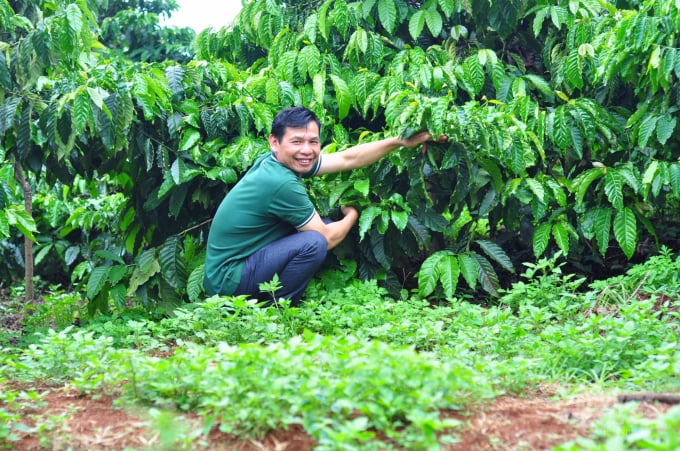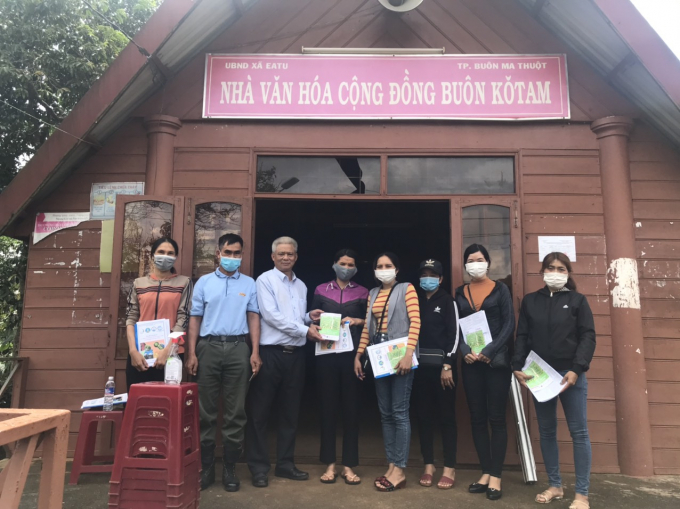November 27, 2025 | 20:32 GMT +7
November 27, 2025 | 20:32 GMT +7
Hotline: 0913.378.918
November 27, 2025 | 20:32 GMT +7
Hotline: 0913.378.918
Dak Lak is one of Vietnam’s key coffee provinces. The green coffee products from this fecund land have been exported to 58 countries and territories around the world and bring significant income to local people.
However, for a long time, many farmers have long formed the habit of using herbicides containing Glyphosate to eliminate weeds in coffee gardens which resulted in reducing the quality of green coffee, making it difficult to export to the world and often have its price pressured.
Facing such a situation, the MARD has promptly issued documents deciding to remove herbicides containing Glyphosate from the list of herbicides allowed to be used in Vietnam. Accordingly, pesticides containing the active ingredient Glyphosate have been officially banned in Vietnam from July 1st, 2021.

Dak Lak Coffee farmers now focus on organic farming, protecting the ecosystem instead of using herbicides indiscriminately as before. Photo: Minh Hau.
The Dak Lak Department of Agriculture and Rural Development has sent documents to localities and units under the Department to direct and instruct farmers not to use Glyphosate herbicides in farming, but instead to take measures such as hand weeding or using lawnmowers to both keep vegetation and prevent erosion as well as washout.
In case there is a need to use herbicides, those with active ingredients that can be used in replacement include Glufosinate ammonium, Diuron, Indaziflam, Basta 15SL, Jiafosina 150SL, Glu-elong 15SL, Glusat 200SL, etc.
According to Mr. Do Thanh Chung, representative of the Global Coffee Platform (GCP) in Vietnam, the maximum allowable residue limit (MRL) of active ingredient Glyphosate in green coffee products exported to Europe is 0.1 mg/kg and is expected to gradually decrease to 0.01 mg/kg.
Thus, according to this level, it is prognosticated that more than 90% of Vietnam's coffee volume will not meet the import requirements of the European market. The GCP therefore advocated that if the Glyphosate problem is not handled in time, Vietnam may lose the largest coffee export market, and farmers’ life will also be affected due to a significant reduction in income.

Ko Tam village farmers of Ea Tu Cooperative (Buon Ma Thuot city) receive a Weed Management Manual supported by GCP. Photo: Dinh Phuong.
Mr. Nguyen Hac Hien, Deputy Director of Dak Lak Crop Production and Plant Protection Sub-Department, said that the GCP in collaboration with the province's agricultural sector and the Vietnam Coffee Coordination Committee are currently implementing the program "Cooperative initiative to use agricultural materials responsibly in Vietnam's coffee industry".
This activity has raised farmers’ awareness and responsibility in coffee production, contribute to increase income and guarantee to meet strict requirements regarding coffee product quality from consuming countries around the world.
Mr. Tran Dinh Trong, Director of Ea Tu Fair Agricultural Service Cooperative (Buon Ma Thuot City), shared that through the warning of the Department of Agriculture and Rural Development and the GCP, it can be said that most coffee farmers in Dak Lak now "say no" to the herbicide Glyphosate.
They are now aware that Glyphosate not only makes coffee export difficult but also seriously affects human health as well as the ecological environment. These are really meaningful actions that contribute towards the prosperity of farmers towards a sustainable coffee production industry.
Translated by Samuel Pham
/2025/11/27/3830-1-152901_403.jpg)
(VAN) Dong Nai is developing its key crop areas, expanding planting area codes, and applying high technology to increase the value of agricultural products, aiming at a green and sustainable agriculture.

(VAN) Tay Ninh’s livestock sector is undergoing a major transformation, applying high-tech, closed-loop circular models to build sustainable value chains.
/2025/11/26/3627-4-082628_818.jpg)
(VAN) From a small café on the red basalt highlands, Le Van Hoang started a business with clean coffee, building Enjoi Coffee into a symbol of organic agriculture in the Lam Dong plateau.
/2025/11/25/0045-1-135246_13.jpg)
(VAN) Ca Mau is researching a model of sea-encroaching embankments combined with viaducts and logistics service zones, aiming both to prevent erosion and create land funds for marine economic development.

(VAN) The information was shared at the seminar 'Urban Agriculture - Solutions for Developing Green Spaces,' organized by the Kinh te & Do thi Newspaper and the Biotechnology Center of Ho Chi Minh City.
/2025/11/19/4141-2-132831_216.jpg)
(VAN) One of Japfa's outstanding solutions is implementing digital transformation and artificial intelligence (AI) to optimize operations, enhance productivity, and advance sustainable development.
/2025/11/19/4847-1-093540_448.jpg)
(VAN) The Gia Lai Provincial People’s Committee had a working session with the delegation of the U.S. Department of Agriculture, the State of Idaho, and representatives of the State's leading enterprises.